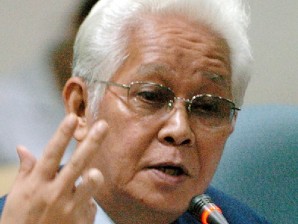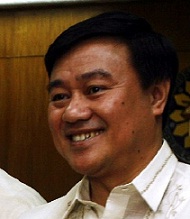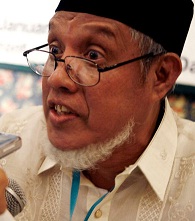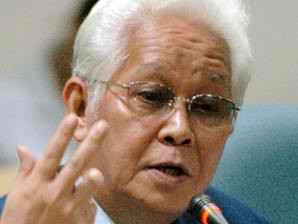By ELLEN TORDESILLAS
 THE displaced director of the Commission on Elections’ Law Department has accused Chairman Sixto S. Brillantes Jr. of unethical behavior for allegedly requesting him to help absolve two Comelec officials ordered suspended by the Office of the Ombudsman for approving the P690 million contract to purchase ballot secrecy folders for the 2010 elections.
THE displaced director of the Commission on Elections’ Law Department has accused Chairman Sixto S. Brillantes Jr. of unethical behavior for allegedly requesting him to help absolve two Comelec officials ordered suspended by the Office of the Ombudsman for approving the P690 million contract to purchase ballot secrecy folders for the 2010 elections.
Lawyer Ferdinand Rafanan, who served as head of the Comelec Law Department for three years until he was relieved on Aug. 15, said Brillantes had asked him pointblank to talk to the Ombudsman’s spokesman on how to clear Bids and Awards Committee (BAC) members Maria Lea Alarkon and Allen Abaya of charges of “simple neglect of duty, simple misconduct and conduct prejudicial to the best interest of the service.”
The irony is, it was Rafanan who had investigated the transaction and concluded an overprice.
Aside from Alarkon and Abayan, BAC member Antonio Santella was also ordered suspended for approving the contract, which was exposed before it could be consummated. BAC members Maria Norina Casingal, Martin Niedo and Comelec executive director Jose Tolentino were cleared of charges.
The Ombudsman released its decision on the contract on Aug. 23. The next day, Rafanan said, Brillantes asked him if he was related to lawyer Asryman Rafanan, the spokesman of new Ombudsman Conchita Carpio-Morales.
He said he replied that he doesn’t know the new Ombudsman spokesman and they haven’t met.
Rafanan said Brillantes then instructed him: “Puntahan mo nga. Gusto ko tulungan natin itong mga kasama natin na may kaso (See him. I’d like to help our two colleagues who have a case). I want to help those two, Alarkon and Abaya.”
Brillantes, Rafanan related, further said, “You were the one who prepared the investigation report. You know the nitty-gritty of this case. You know how to absolve them.”
 Rafanan said he wondered why Brillantes excluded Santella but didn’t ask because he was shocked to hear the request.
Rafanan said he wondered why Brillantes excluded Santella but didn’t ask because he was shocked to hear the request.
He said what Brillantes asked him to do was a violation of Republic Act 3019, the Anti-Graft and Corrupt Practices Act, which declares unlawful the act of “persuading, inducing or influencing another public officer to perform an act constituting a violation of rules and regulations duly promulgated by competent authority or an offense in connection with the official duties of the latter, or allowing himself to be persuaded, induced, or influenced to commit such violation or offense.”
Brillantes admitted he talked to Rafanan about helping the Comelec officials ordered suspended by the Ombudsman but not to absolve them.
He said he just wanted clarification on whether the six-month preventive suspension of the three officials in 2010 could be applied to the decision. Brillantes added that when Rafanan said he didn’t know the new Ombudsman spokesman, he wrote the Ombudsman for clarification.
Brillantes said he has not gotten a reply as of Wednesday but that he has implemented the penalty even it he thinks it’s too heavy, “considering that it was just simple neglect of duty.”
“There was no dishonesty,” he said.
Last Thursday, Brillates said he got a reply from the Ombudsman saying that the 2010 six months preventive suspension “is totally different from the six months penalty.”
Brillantes said he did not think his request for Rafanan to talk to the new Ombudsman spokesman was unethical because even Rafanan himself had told him the three were not the major players in the case.
Commissioner Augusto Lagman, who was in the room together with seven other Comelec officials when Brillantes talked to Rafanan, said he did not think much of the request, as it was “just mentioned in passing.”
On Aug. 26, Comelec commissioners met again en banc and decided to reassign Rafanan to the Planning Department. Esmeralda Amora-Ladra, head of Planning, replaced Rafanan at the Law Department.
The commissioners also decided to pre-terminate Rafanan’s assignment to the Joint Committee of the Comelec and the Department of Justice to investigate the 2004 and 2007 election fraud.
In a media interview, Brillantes branded Rafanan as “uncontrollable,” and expressed surprise and exasperation that he would be making such comments.
 He said Rafanan accepted the changes in the election body after it was explained to him that he had to be removed from the Law Department to allow the atmosphere to cool down because of his differences with his deputy, Josellyn Demesa, and Commissioner Elias R. Yusoph.
He said Rafanan accepted the changes in the election body after it was explained to him that he had to be removed from the Law Department to allow the atmosphere to cool down because of his differences with his deputy, Josellyn Demesa, and Commissioner Elias R. Yusoph.
Demesa was the subject of an anonymous complaint that accused her of violating the Omnibus Election Code provision banning any person from acting as chairman or member of board of canvassers if he or she is related within the fourth civil degree of consanguinity or affinity to any of the candidates whose votes will be canvassed.
The investigation showed that in the 2010 elections, Demesa served as chairman of the Provincial Board of Canvassers (PBOC) of Lanao del Sur despite the fact that her daughter, Iris Mae Demesa Montes, was a nominee of the Alliance of Volunteers Educators (AVE), a party-list organization that participated in the elections.
In her defense, Demesa said her designation and assumption of the chairmanship of the PBOC of Lanao del Sur “was under the direction of the Commission en banc and the information about my daughter being the second nominee of AVE was known to Atty. Bartolome J. Sinocruz, Director for Operations.”
Demesa also said that she informed Commissioner Elias R. Yusoph about her daughter being a nominee of AVE and even recommended other lawyers for the position but the commissioner said she was “highly recommended.”
Section 261 (bb) (3) of the Omnibus Election Code provides that an election offense is committed by “any person who, being ineligible for appointment as member of any board of election inspectors or board of canvassers, accepts an appointment to said body, assumes office, and actually serves as a member thereof, or any public officer or any person acting in his behalf who appoints such ineligible person knowing him to be ineligible. ”
On Sept. 10, 2010, Rafanan recommended the filing of an election offense complaint against Demesa.
He also recommended the filing of an independent and separate administrative charge against her for grave misconduct, conduct unbecoming of a public officer, conflict of interest and violation of the Comelec Code of Conduct and Ethics, Omnibus Election code and Comelec en Banc Resolution No. 8809 pertaining to the conduct of the May 10, 2010 elections.
He also recommended that the commission endorse the case to the Office of the Ombudsman and the Civil Service Commission in order not to be accused of bias, whitewashing the case, or protecting an alleged election law violator who is an insider.
On Jan. 11, 2011, four days before then Comelec Chairman Jose Melo stepped down, the commission, including Yusoph, unanimously dismissed Rafanan’s recommendation “for lack of merit.”
They instead ordered that Rafanan be made to explain why he failed to inform the commission that Demesa’s daughter was among the nominees of the AVE party-list. “(I)gnoring the alleged violations of Atty. Demesa would constitute not only a toleration of crime but would also entail this commission liable for complicity as co-principal, accomplice or accessory,” the Melo-led Comelec said.
In his explanation, Rafanan said he didn’t know of the relation of Iris Marie D. Montes to Demesa at the time of the election.
He asked, “Why is she (Demesa) not being required to explain why she did not divulge her relationship to the en banc? …Or why is there no request for Commissioner Elias Yusoph to explain why he did not disclose to the en banc the relationship of Atty. Demesa which she had confided?”
Immediately after submitting the explanation, Yusoph barged into Rafanan’s office, and was later joined by Demesa, and accosted him on why his name was mentioned in the Demesa case.
Rafanan said when he informed Brillantes, who was appointed Comelec chair Jan. 15 that he was going to file a motion for reconsideration of the dismissal of the Demesa case, he was advised, “Tumahimik ka muna (Keep quiet for awhile).” He said Brillantes didn’t hide his displeasure when he filed the motion.
Rafanan said Brillantes also told him that Yusoph wanted him dismissed.
In February 2011, Rafanan filed a motion for reconsideration on the Demesa case. Brillantes said he told Rafanan then, “Let’s wait until I get confirmed (by the Commission on Appointments). Linisin natin ito (Let’s clean it up),” referring to Comelec.
Lagman said although he recognizes that Rafanan is honest and upright, his lack of “EQ” (emotional intelligence quotient) is getting in the way of the Comelec’s operations.
Rafanan said, “Bakit? Masama ba ang gumawa ng tama (Why? Is it wrong to do right)?”
